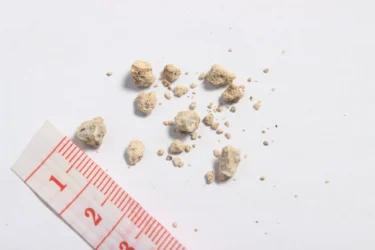What is Magnesium Glycinate? Benefits, Uses, Dosage & Side Effects
By Dr. Vishesh Bharucha +2 more

Get,

to manage your symptom
Get your,


4 Cr+ families
benefitted

OTP sent to 9988776655



You’ve successfully subscribed to receive
doctor-approved tips on
Whatsapp

Get ready to feel your best.

Hi There,
Download the PharmEasy App now!!


Register to Avail the Offer
Send OTPBy continuing, you agree with our Privacy Policy and Terms and Conditions

Hi There,
Sign up on PharmEasy now!!
Trusted by 4 crore+ families

OTP sent to 9988776655



You have unlocked 25% off on medicines




Code: NU25
By Dr. Vishesh Bharucha +2 more
Table of Contents
Magnesium is an important mineral that may help the body in several processes, including producing energy, helping muscles move, and supporting nerves to send signals. It also helps control blood sugar and blood pressure. Most of the magnesium is stored in bones and muscles, and only a small amount circulates in the blood. Low magnesium levels in blood can cause muscle cramps, weakness, poor nerve function, and even serious heart problem1,2.
When magnesium levels drop, doctors may recommend the most suitable form of magnesium supplementation to meet individual needs. There are different types of magnesium supplements available, like magnesium oxide, citrate, chloride, lactate, and glycinate. Among these, magnesium glycinate is a well-absorbed form in which magnesium is bound to an amino acid called glycine. This combination not only improves absorption but also makes it gentler on the stomach, reducing the chance of digestive discomfort compared to other forms. Magnesium glycinate has been shown to be helpful for people experiencing stress, anxiety, sleep difficulties, or tiredness3,4.

In this blog, we will explore magnesium glycinate benefits, uses, side effects, and foods containing magnesium glycinate.
Magnesium glycinate is a nutritional supplement that provides the body with magnesium. In this form, magnesium is joined with glycine, a small building block of protein. Together, they form a stable compound called a chelate4,5. This may help the body absorb magnesium better, giving it high bioavailability. Bioavailability means the amount of magnesium the body can actually use after taking it6.
The amount absorbed may depend on many factors. Internal factors include age, overall health, and how much magnesium is already in the body. External factors include the dose, the type of food eaten with it, and the form of the supplement. Some suppliers of raw materials do not fully join magnesium with glycine. Instead, they may just mix magnesium carbonate or magnesium oxide with glycine and call it magnesium glycinate. This is only a dry mix of two separate compounds, with little or no actual bonding, so it is not the same as true magnesium glycinate. It is recommended to choose a high-quality, approved supplement with good formulation4,6.
Next, we will look at the benefits of magnesium glycinate.
Magnesium glycinate may be recommended when the body’s magnesium levels are low, or when magnesium from food is not enough5,7. It is considered useful for supporting various areas of health including:

Magnesium supplementation may play an important role in calming certain brain switches called NMDA receptors, which may become overactive when magnesium levels are low. It may also help relax blood vessels and aid in circulation to support healthy brain and nerve function4,8.

Magnesium supplementation, along with zinc, selenium, vitamin C, and vitamin E, may show positive effects in regulating blood sugar. It may help improve insulin sensitivity, keeping fasting sugar levels under control. It may also help maintain healthy cholesterol levels in people with diabetes and heart disease.

Magnesium is needed to convert vitamin D into its active form, helping the body absorb calcium and support parathyroid hormone activity. Supplementation with magnesium may contribute to bone health, especially when combined with vitamin D and calcium. It may also help lower bone turnover in elderly women after menopause.

Magnesium taken orally may act as a natural calcium channel blocker, which can help ease blood vessel tension, improve blood vessel function in the heart, and may even help control blood pressure in people with diabetes and heart disease.

Magnesium may help in muscle contraction. When levels are low, magnesium deficiency can cause muscle cramps. By restoring magnesium levels, muscle function may improve3,7.

Magnesium supplementation may reduce calcium oxalate crystal formation and decrease intestinal oxalate absorption, helping prevent kidney stone formation6.

Magnesium helps the body make serotonin, a chemical that affects mood and feelings of happiness. Magnesium supplementation may help calm the brain by slowing overactive signals and supporting relaxing signals (GABA agonist), which can make it easier to feel calm and sleep better, but these effects are not very strong or consistent3,7.

Magnesium glycinate may help protect the body from oxidative stress and help fight inflammation in the body owing to its antioxidant and anti-inflammatory properties3,8.
An important benefit of magnesium glycinate is that it is a chelated form, where magnesium is bonded with glycine. It is well absorbed by the body, with some of it taken in as a small, complete unit called a dipeptide in the upper part of the small intestine. This special absorption makes it gentle on the stomach and an effective option compared to other types of magnesium supplements4,6.
Note: While initial studies have shown benefits of magnesium supplementation, further large-scale human-trials are needed to confirm these.
Magnesium glycinate may be used in the management of several health conditions including:
Thus, magnesium glycinate may be useful inmanaging magnesium deficiency and related health issues, and next we will see how it compares with other types of magnesium in effectiveness, absorption, and tolerance.
Magnesium supplements come in many forms, mainly divided into two types: inorganic or organic. Inorganic forms, like magnesium oxide, may provide a high amount of magnesium but may not be absorbed well in the gut. Organic forms, like magnesium citrate, may dissolve more easily and may be absorbed better1.
One important magnesium glycinate benefit is, it is one of the organic forms that is gentle on the gut and may usually cause fewer stomach issues or loose stools compared to some other forms. It has high bioavailability and is usually absorbed well in the gut14,15. Thus, it may be a suitable option for long-term use and for people with special needs, like after intestinal surgery (ileal resection), where absorption is affected13.
Other forms of magnesium may vary in absorption and effects:
Overall, magnesium glycinate may offer better absorption, higher bioavailability, and fewer digestive issues, and may be a well-tolerated choice compared to many other forms of magnesium.
Low magnesium may not always show clear signs, especially if the shortage is mild. However, when the deficiency becomes excessive, it may affect muscles, nerves, and the heart.
People with conditions like diabetes may be more likely to have low magnesium, and long-term deficiency may increase the risk of heart problems6,7.
Magnesium glycinate may be prescribed in different amounts depending on the situation. The recommended dose is mostly 200- 400mg of elemental magnesium per day, sometimes given in divided doses. At higher doses, side effects like diarrhoea may occur4.
The doctor may decide the exact dose based on your individual needs, condition, and health situation.
Magnesium glycinate is generally well tolerated, and side effects are uncommon. Some people may notice mild stomach issues at high doses of supplements, which can sometimes cause loose stools, nausea, or abdominal cramps. Very high levels may rarely lead to more serious issues like low blood pressure, extreme tiredness, or irregular heartbeat3,7. Other effects like sleep changes, headaches, dizziness, increased thirst, frequent urination, or joint pain are very rare or unlikely14,17.
When you experience these magnesium glycinate side effects, you need to pay attention and let your doctor know. Your doctor may adjust the dose or check for interactions with any medicines you are taking. The dose your doctor decides may depend on your health condition and what magnesium is prescribed for.
Also Read: Everything to Know About GLP-1 Receptor Agonist and Its Role in Weight Management
Foods do not naturally have magnesium glycinate, but many contain magnesium itself, which the body can use. Green leafy vegetables like spinach and kale, legumes such as beans and lentils, nuts including almonds and cashews, and seeds like pumpkin or chia are good sources. Whole grains, brown rice, soy products, and some dairy like milk and yogurt also provide magnesium. Certain breakfast cereals are fortified with magnesium to add extra amounts.
The amount of magnesium in foods can vary depending on how they are processed. For example, refined grains lose magnesium when the nutrient-rich parts are removed. Water can also contain magnesium, though levels vary by source. Eating a mix of these foods helps the body get enough magnesium to support normal functions.
Examples of magnesium-rich foods: spinach, kale, beans, lentils, almonds, cashews, pumpkin seeds, chia seeds, brown rice, oatmeal, milk, yoghurt, salmon, and avocado2,7.
Also Read: Foods To Avoid While Taking Metformin
Magnesium glycinate may be a helpful option when your body needs extra magnesium or food alone is not enough to meet the needs. It may be absorbed well, is gentle on the stomach, and suitable for long-term use in healthy adults with normal kidney function, or for special needs, like after intestinal surgery. People with kidney problems should use it with caution and under monitoring. Other forms of magnesium may work differently in absorption and tolerance. Your doctor may decide if magnesium glycinate is right for you, and the exact dose will depend on your health and what it is prescribed for.
Magnesium in forms like citrate, oxide, aspartate, and chloride are used to support healthy blood pressure. No single form is shown to be superior; dose and duration are more important. A daily intake of about 400-500 mg may be associated with blood pressure benefits. Among the types, magnesium citrate is absorbed well, oxide may sometimes upset the stomach, and magnesium glycinate is gentle and its use in high blood pressure is under research4,18.
Magnesium glycinate is not a sleeping pill. It may support relaxation and calm the nervous system, which can help with sleep in some people. Your doctor may decide if it is appropriate for your sleep needs3,7.
Magnesium glycinate may be used to reduce the frequency and severity of migraine headaches. It is well absorbed and gentle on digestion. Your doctor may advise if it is suitable for your situation and the correct dose4.
Magnesium glycinate may help regulate nerve signals in the brain, supporting calmness and normal function. It may help protect nerve cells and support overall brain activity4,8.
The best time to take magnesium glycinate depends on doctor guidance and the condition being treated. Some people may take it at different times, in divided doses, or after meals or at bedtime. Timing can vary and should follow individual recommendations16,18.
Disclaimer: The information provided here is for educational/awareness purposes only and is not intended to be a substitute for medical treatment by a healthcare professional and should not be relied upon to diagnose or treat any medical condition. The reader should consult a registered medical practitioner to determine the appropriateness of the information and before consuming any medication. PharmEasy does not provide any guarantee or warranty (express or implied) regarding the accuracy, adequacy, completeness, legality, reliability or usefulness of the information; and disclaims any liability arising thereof.
Links and product recommendations in the information provided here are advertisements of third-party products available on the website. PharmEasy does not make any representation on the accuracy or suitability of such products/services. Advertisements do not influence the editorial decisions or content. The information in this blog is subject to change without notice. The authors and administrators reserve the right to modify, add, or remove content without notification. It is your responsibility to review this disclaimer regularly for any changes.
Comments

Leave your comment...
You may also like
Comments